Hi Stackers!
From time to time, I tend to read a bunch of books with similar themes, genres, tropes, author backgrounds, etc. I do this in part to enrich my reading as a human being and also to add variety and depth to displays, which is often a part of my job.
We’ve talked previously about how reader’s advisory is one of my favorite parts of working at a library. My reading interests are already pretty broad (and occasionally deep), but I’ve noticed people are much more likely to read a book I suggest when I’ve read it - because I have personal passion and insight behind my suggestion, I suspect.
So as a library worker who does displays, my displays are often themed around holidays, weekly or monthly observations, etc. February in New Orleans is usually Carnival season, so we have extra options for display themes. But since Black History Month is also in February, the shortest month of the year, which also contains Valentine’s Day, it can be extra challenging to give BHM the space and time it deserves.
Because, again, BHM is the shortest month of the year, because diversity, equity and inclusion (DEI) has come under attack so virulently in the last few years, especially in the last few weeks and months, I’ve been compelled to create personal reading policies, as well as a display policy I generally follow.
Personal reading policy - I’m going to read books by Black authors year-round. My first step, a few years ago, was to do an audit of my reading (it helps that I track my reading) and reflect on how many Black authors I’d read in the last few months and years. I’d previously done this with female authors shortly after I finished grad school. After auditing and reflecting, I consciously sought out books by Black authors (and previously, female authors). I’m lucky that as a writer, I’ve always been in community with Black writers. My friends’ mentors and favorite authors were then a great next layer for me to investigate - I just had to ask for suggestions, or listen when they mentioned books and authors.
I’ve noticed that after auditing and introducing more Black and female authors into my reading, I quickly found favorites and it became less a conscious task and more an automatic reflex to request and read new books by authors I’d come to appreciate and enjoy, as well as to read books that may not have been written for me, but are interesting to me. As I’ve written about before, my friend Jamey Hatley introduced me to Roxane Gay (among others!), who became one of those authors and when she blurbed Jasmine Guillory’s debut romance novel, I quickly read and adored everything Jasmine Guillory wrote or blurbed. From there, I discovered a universe of diverse romance authors and stories that re-energized my love for the genre.
My BHM display policy is that because BHM is during the shortest month and there’s often competition with Mardi Gras and Valentine’s Day, I often combine themes, but I always extend BHM into March, making sure I include Black women (among others) in my Women’s History displays.
Here’s a gallery of just some of my displays from the last few years so you can see what I’m talking about:
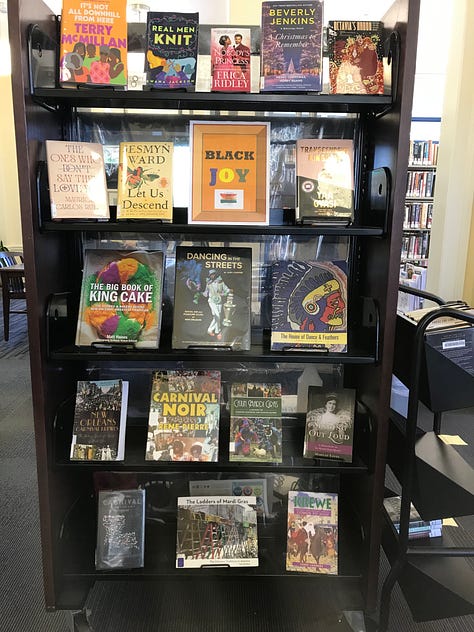
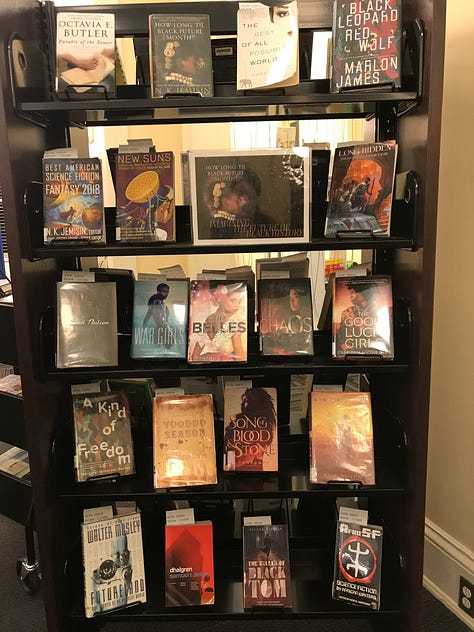
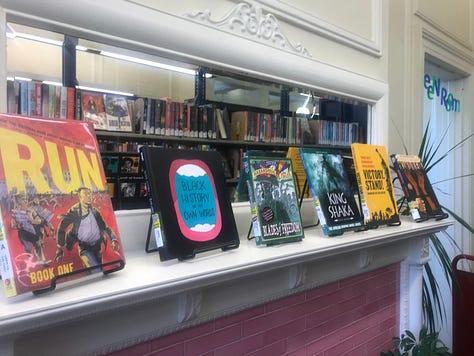
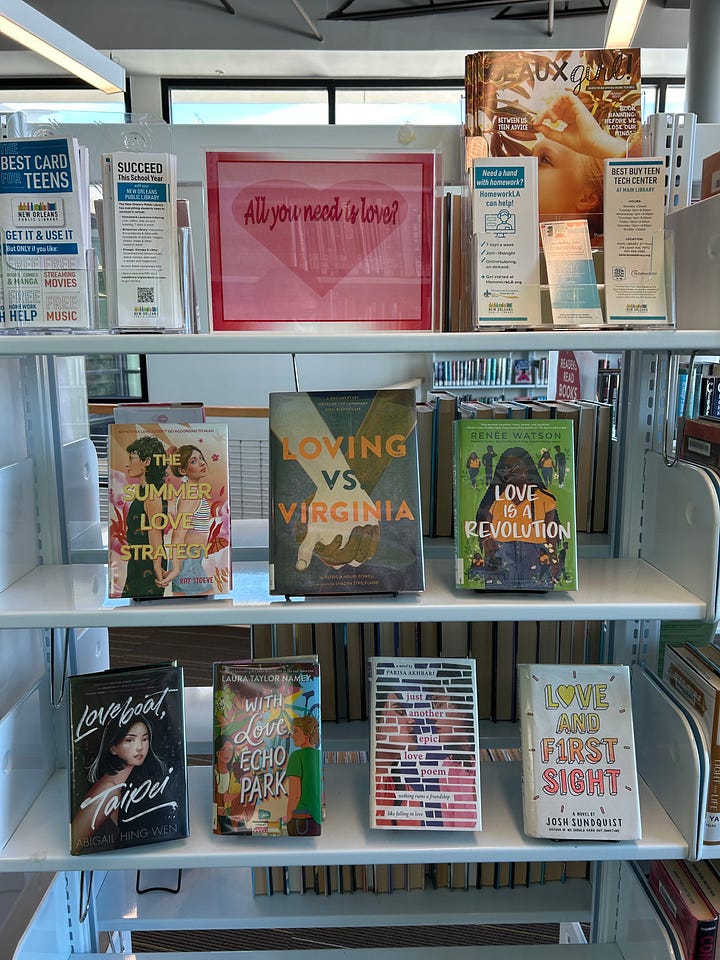
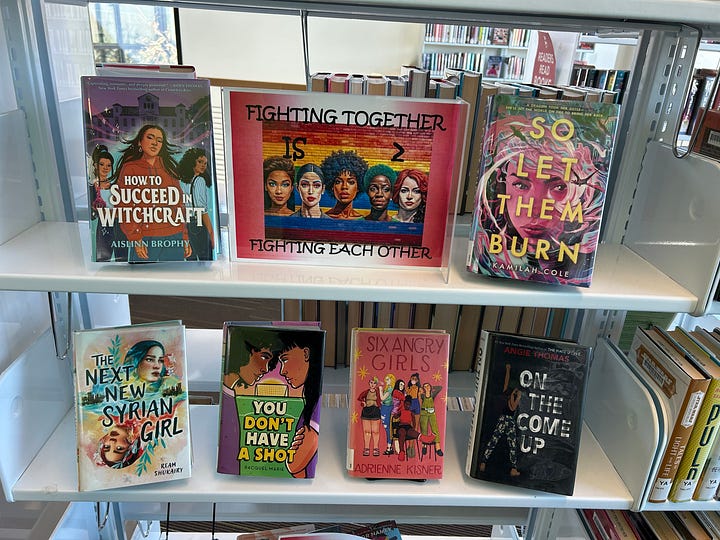
With all of that said, I’ll share more of my February reading, including books by Black authors, later this month. I usually share my reading by “here’s a mix of things I read recently” or themed by genre. There are Black authors in most reading roundup posts that I do, though I don’t usually identify them as such. But since I planned to do a romance roundup for this month, and since books by Black authors are being targeted by “DEI bans,” I thought it might be good to also share some books by Black authors that might not be easily categorized in one of my other themed roundups.
For instance, I read Mourning Glory, a book co-authored by two Black women, L.L. McKinney and Bethany C. Morrow, who have each written YA fiction separately. The main characters are all young adults in the literal sense - over 18, but under 25. While “new adult” is a category, the Goodreads tags include: fantasy, horror, contemporary, supernatural, witches. I’ve read L.L. McKinney’s YA before, but I’m not sure how I found this one. Since I listened to the audiobook, which is narrated by my favorite audiobook narrator Bahni Turpin, it’s possible that I found it by searching books she’s narrated. I’ve done that before - I will literally listen to anything she narrates. The cover is absolutely arresting, so that probably prompted me to read the description and then the book. This is a family saga featuring three sisters, their cousin, their grandmother/great-aunt and various other family members and it was one of the best experiences I’ve ever had listening to a book. Each of the sisters/cousins are easy to tell apart both in how they’re written and how they’re narrated. The horror was absolutely horrifying - both as written and as performed by Turpin (the way she says “Cauley” as the demon Legion is truly terrifying), the relationships between the characters, the magic and the action, everything added up to an incredible experience. I want everyone to listen to this audiobook (which includes sound effects!) and then let me know - I have a question for you because I’m interested in other readers’ perspectives. If you read, but don’t listen to, the book, still let me know, but my question is especially for listeners of the audiobook.
I’ve also been listening to two nonfiction titles written by Black women and I’d love if anyone wants to join me in reading/talking about them. While I haven’t finished reading them yet, I’ve found myself transformed already by both and I used some of what I’ve learned from one just this week (I may record a voice message about it soon, but I’ll definitely be thinking/talking/writing about this experience in some, if not many, forms).
These two nonfiction titles are:
Fearing the Black Body: the Racial Origins of Fat Phobia by Sabrina Strings, which I’ve been reading since last year, and All About Love by bell hooks.
Join me in reading and celebrating Black writers all year, every year!




